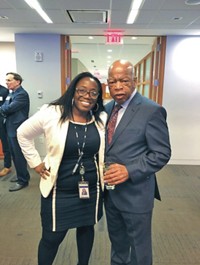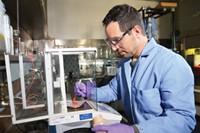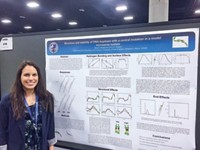Advertisement
Grab your lab coat. Let's get started
Welcome!
Welcome!
Create an account below to get 6 C&EN articles per month, receive newsletters and more - all free.
It seems this is your first time logging in online. Please enter the following information to continue.
As an ACS member you automatically get access to this site. All we need is few more details to create your reading experience.
Not you? Sign in with a different account.
Not you? Sign in with a different account.
ERROR 1
ERROR 1
ERROR 2
ERROR 2
ERROR 2
ERROR 2
ERROR 2
Password and Confirm password must match.
If you have an ACS member number, please enter it here so we can link this account to your membership. (optional)
ERROR 2
ACS values your privacy. By submitting your information, you are gaining access to C&EN and subscribing to our weekly newsletter. We use the information you provide to make your reading experience better, and we will never sell your data to third party members.
Programs
Project SEED scholar Marc McKithen
From one bench to the next, Project SEED scholar Marc McKithen reflects on his career in chemistry and law
by Arminda Downey-Mavromatis
July 22, 2018
| A version of this story appeared in
Volume 96, Issue 30

Vitals
▸ Hometown: Trenton, N.J.
▸ Year in Project SEED: 1991
▸ Education: B.S., chemistry, Rider University; M.S., chemistry, University of North Carolina, Chapel Hill; J.D., Benjamin N. Cardozo School of Law
▸ Current position: Chief judge, Trenton Municipal Court
▸ Why McKithen loves the program: Project SEED impacts kids throughout their entire lives.
A chemist turned lawyer, Marc A. McKithen says his training in chemistry is never far from his mind in his current position as chief judge at Trenton Municipal Court in New Jersey.
Practicing law and practicing chemistry, he explains, follow similar steps. You identify a problem, “then you have to do some research and figure out what has been done before or what’s the current state of the law or current state of the science.”
After completing a literature review, lawyers and chemists both create a hypothesis and a plan of action. From there, they deviate. Lawyers build a case, and chemists generate data. But none of the previous steps are effective if you can’t communicate your results.
“One of the reasons I probably didn’t go into law earlier,” McKithen says, “is because I was always saying, ‘Well, I’m good at math. I’m not the best writer.’ ”
In fact, it was chemistry, not a humanities course, that led McKithen to see the power of communication. “I realized you can’t be a successful chemist if you can’t write or explain what you’ve done.”
Today, McKithen presides over minor, municipal offenses like health code violations and drug possession. While major crimes like theft and assault are filed within a municipal court room, they are transferred out to the superior court.
McKithen became involved in chemistry after his junior year at Trenton Central High School. A high school instructor, Deborah McBride, introduced him to the ACS Project SEED program. McKithen met with John Sheats, a longtime chemistry professor at nearby Rider University. Sheats had restarted Rider’s involvement in Project SEED. His lab was, at the time, focused on inorganic chemistry. All the Project SEED students in Sheats’s lab, McKithen remembers, were from his high school.
McKithen worked on “making organic metallic dyes” within Sheats’s laboratory. While he was unable to complete the entire summer, the experience changed the course of his college career. His connection to the program spanned into his adult life. He donated $1,000 to another Rider University Project SEED mentor, allowing her to start a chapter of the program at Duquesne University in Pittsburgh.

After graduating from high school in 1992, McKithen enrolled at Rider University. Rider was about 8 km from McKithen’s high school, and he was at first hesitant to stay so close to home. Familiarity and finances won out. McKithen already knew the campus and the professors. On top of that, he was awarded a full-tuition scholarship from the university. His place on the varsity track team secured him funding for room and board.
While attending Rider, McKithen continued to work in Sheats’s lab alongside Project SEED students. After receiving his B.S. in chemistry from the university, McKithen began a Ph.D. program at the University of North Carolina, Chapel Hill.
He switched his lab coat for a briefcase in 1998 and left UNC Chapel Hill with a master’s in chemistry. He moved to New York City to begin law school at Benjamin N. Cardozo School of Law at Yeshiva University and earned his J.D. in 2001.
Advertisement
McKithen is quick to note that his move into law was not a rejection of chemistry. When he was an attorney, many of his clients were pharmaceutical companies. McKithen has represented AstraZeneca, Bristol-Myers Squibb, and Merck. “The fact that I had an advanced degree in chemistry plus a law degree made me more competitive,” he says. “I was really trying to help kind of bridge the gap between chemistry and law.”
McKithen was heavily involved in the American Chemical Society until around 2009, he says. He served on several committees and the Chemistry & the Law Division. He credits his regular attendance of ACS national meetings for making connections and maintaining his chemistry knowledge. Friends made at the national meetings still invite him out to dinner, though his current position as a municipal court chief judge isn’t quite as chemically involved. An ACS meeting even introduced McKithen, then an undergraduate, to the man who would later become his graduate adviser.
“Sheats would say that I attended the meeting by myself, but I was with other students, and came back with an internship that ended up getting me into graduate school.”
Connections and continuing education, he says, are the tangible benefits of the Project SEED program. The program has a ripple effect, giving participants an awareness of and appreciation for science that they carry with them for life.





Join the conversation
Contact the reporter
Submit a Letter to the Editor for publication
Engage with us on Twitter